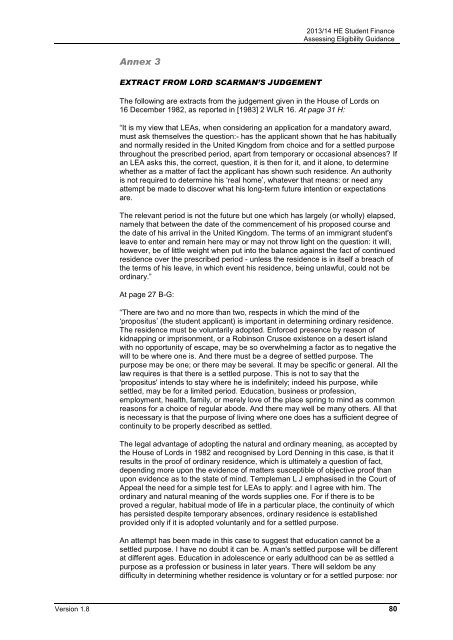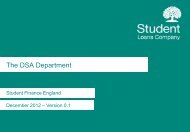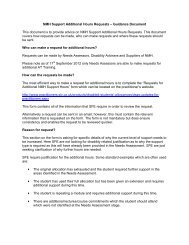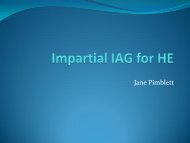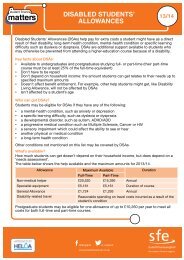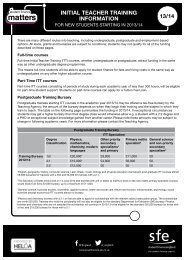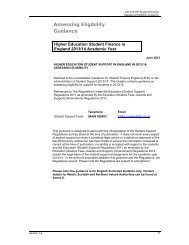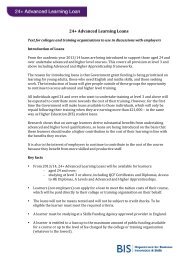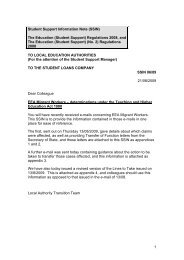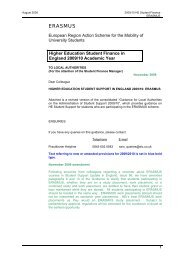SFE Assessing Eligibility Guidance 2013/14 - Practitioners - Student ...
SFE Assessing Eligibility Guidance 2013/14 - Practitioners - Student ...
SFE Assessing Eligibility Guidance 2013/14 - Practitioners - Student ...
You also want an ePaper? Increase the reach of your titles
YUMPU automatically turns print PDFs into web optimized ePapers that Google loves.
<strong>2013</strong>/<strong>14</strong> HE <strong>Student</strong> Finance<br />
<strong>Assessing</strong> <strong>Eligibility</strong> <strong>Guidance</strong><br />
Annex 3<br />
EXTRACT FROM LORD SCARMAN’S JUDGEMENT<br />
The following are extracts from the judgement given in the House of Lords on<br />
16 December 1982, as reported in [1983] 2 WLR 16. At page 31 H:<br />
“It is my view that LEAs, when considering an application for a mandatory award,<br />
must ask themselves the question:- has the applicant shown that he has habitually<br />
and normally resided in the United Kingdom from choice and for a settled purpose<br />
throughout the prescribed period, apart from temporary or occasional absences If<br />
an LEA asks this, the correct, question, it is then for it, and it alone, to determine<br />
whether as a matter of fact the applicant has shown such residence. An authority<br />
is not required to determine his „real home‟, whatever that means: or need any<br />
attempt be made to discover what his long-term future intention or expectations<br />
are.<br />
The relevant period is not the future but one which has largely (or wholly) elapsed,<br />
namely that between the date of the commencement of his proposed course and<br />
the date of his arrival in the United Kingdom. The terms of an immigrant student's<br />
leave to enter and remain here may or may not throw light on the question: it will,<br />
however, be of little weight when put into the balance against the fact of continued<br />
residence over the prescribed period - unless the residence is in itself a breach of<br />
the terms of his leave, in which event his residence, being unlawful, could not be<br />
ordinary.”<br />
At page 27 B-G:<br />
“There are two and no more than two, respects in which the mind of the<br />
„propositus‟ (the student applicant) is important in determining ordinary residence.<br />
The residence must be voluntarily adopted. Enforced presence by reason of<br />
kidnapping or imprisonment, or a Robinson Crusoe existence on a desert island<br />
with no opportunity of escape, may be so overwhelming a factor as to negative the<br />
will to be where one is. And there must be a degree of settled purpose. The<br />
purpose may be one; or there may be several. It may be specific or general. All the<br />
law requires is that there is a settled purpose. This is not to say that the<br />
'propositus' intends to stay where he is indefinitely; indeed his purpose, while<br />
settled, may be for a limited period. Education, business or profession,<br />
employment, health, family, or merely love of the place spring to mind as common<br />
reasons for a choice of regular abode. And there may well be many others. All that<br />
is necessary is that the purpose of living where one does has a sufficient degree of<br />
continuity to be properly described as settled.<br />
The legal advantage of adopting the natural and ordinary meaning, as accepted by<br />
the House of Lords in 1982 and recognised by Lord Denning in this case, is that it<br />
results in the proof of ordinary residence, which is ultimately a question of fact,<br />
depending more upon the evidence of matters susceptible of objective proof than<br />
upon evidence as to the state of mind. Templeman L J emphasised in the Court of<br />
Appeal the need for a simple test for LEAs to apply: and I agree with him. The<br />
ordinary and natural meaning of the words supplies one. For if there is to be<br />
proved a regular, habitual mode of life in a particular place, the continuity of which<br />
has persisted despite temporary absences, ordinary residence is established<br />
provided only if it is adopted voluntarily and for a settled purpose.<br />
An attempt has been made in this case to suggest that education cannot be a<br />
settled purpose. I have no doubt it can be. A man's settled purpose will be different<br />
at different ages. Education in adolescence or early adulthood can be as settled a<br />
purpose as a profession or business in later years. There will seldom be any<br />
difficulty in determining whether residence is voluntary or for a settled purpose: nor<br />
Version 1.8 80


